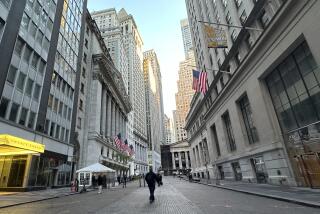Stocks Retreat on Weak Economic Signs
- Share via
Market Overview
* A triple taste of bad economic news sent the stock market lower as new home sales, consumer confidence and an index designed to predict the future all declined.
* The dollar fell against most major currencies amid the weak economic news.
* Long-term bond yields were unchanged and prices were slightly lower as a two-week rally, which has pushed yields to record lows, lost steam.
Stocks
The drop ended a three-day rally spurred by lower interest rates.
The Dow Jones average dropped 11.35 points to 3,518.85 on Big Board volume totaling 276.31 million shares, compared to 240.43 million in the previous session. Declining issues barely outnumbered advances on the New York Stock Exchange.
Stocks moved steadily lower throughout the day after the bad economic news. Economic weakness often worries stock investors because it usually hurts corporate profits. Stocks picked up only late in the session.
The government reported Tuesday that new home sales plunged 21% in May as buyers remained skittish about the economy despite cheap prices and the lowest mortgage rates in two decades.
Analysts had expected a 10% decline, but what they got was the worst drop since April, 1980, wiping out a nearly identical gain in April.
Later, the Conference Board reported its consumer confidence index fell 3 points in June, continuing a near-steady decline since the presidential election. Analysts had expected it to rise.
Finally, the Commerce Department’s index of leading economic indicators, designed to predict the economy in six to nine months, fell 0.3% in May. That was worse than the 0.1% analysts expected.
“All of this suggests that the economy continues to suffer a serious malaise,” said James Solloway, director of research at Argus Research Corp. in New York.
Several “cyclical” stocks, which rise and fall with the economy, suffered Tuesday, especially forest products, which are sensitive to the home sales figures.
* Boise Cascade closed at 22 3/4, down 1 5/8; Georgia Pacific lost 1 1/8 to close at 57 1/2, and Louisiana Pacific fell 1 1/2 to 30.
Peter Canelo, chief investment strategist at NatWest Securities Corp., was more upbeat, saying the statistics will snap back.
“These numbers are just statistical noise,” Canelo said.
Tempering the decline, analysts said, were purchases by investment managers trying to improve the appearance of their portfolios at the end of the second quarter when they must report to shareholders. The quarter ends Wednesday.
* Stock of several computer makers fell on fears the price war in the United States will spread to Japan. Compaq fell 4 1/8 to 49 3/4.
* Oppenheimer & Co. initiated coverage of Compaq, recommending that investors sell the stock. IBM lost 1 to 49 3/8, while on the NASDAQ market, Apple fell 1 1/8 to 39 and Dell dropped 7/8 to 19.
* Advanced Micro Devices, however, rose 1 7/8 to 24 on the Big Board after First Boston raised its rating on the stock.
* An initial public offering of YPF Sociedad, Argentina’s state-owned oil company, ended the day at 21 7/8 on the NYSE. The $3-billion offering was priced Monday at $19 a share.
* EK Chor China Motorcycle Co., another initial offering, ended at 24 1/8. The offering of 4.42 million shares was priced Monday at $21.
Currency
Currency traders said the dollar was the victim of the economic news.
Traders said they wanted to see Friday’s unemployment figures to determine how bad the U.S. economy might be. They also were holding back on more dramatic action until the Group of Seven industrial nations meets in Tokyo next week.
The dollar closed in New York at 1.693 German marks, down from Monday’s 1.700 marks. However, the greenback rose to 106.50 Japanese yen, up from 106.25.
The British pound was worth $1.5118, more than the $1.4965 it traded for Monday.
Other Markets
Prices of shorter-term Treasury securities edged higher as the evidence of slow economic growth seemed to reduce the odds that the Federal Reserve will tighten monetary policy.
Some of America’s best-known corporations, meanwhile, rushed out more than $2 billion in new bonds to take advantage of the recent decline in yields.
The yield on the Treasury’s bellwether 30-year bond was unchanged at 6.67% and its price fell 1/16 point, or 63 cents per $1,000 in face value.
Economists said the latest signs of a sputtering recovery apparently leave less room for an interest rate increase by the central bank. Higher rates can be a drag on an already sluggish economy. In addition, inflation tends to remain low during periods of slow growth.
That sentiment helped boost short-term securities after weeks of decline on expectations the Fed would raise interest rates, which would diminish the value of existing fixed-income securities. The Fed reportedly leaned toward higher short-term rates, as a way to combat nascent inflation pressures, at its mid-May policy-making meeting.
“The concern about the Fed tightening is fading, allowing the short-end to unwind the damage (done) when Fed tightening fears were first announced,” said Douglas Schindewolf, a money market economist at Smith Barney, Harris Upham & Co.
The federal funds rate, the interest on overnight loans between banks, fell to 2.938% from 3.063% on Monday.
In commodities trading, gold prices rose despite the normal summer lull in demand.
On New York’s Commodity Exchange, gold for current delivery settled at $378.60 an ounce, up $3.40 from Monday. Silver traded at $4.563 an ounce, up from $4.448 on Monday.
Most energy futures contracts were higher on the New York Mercantile Exchange, with light, sweet crude oil for August rising 11 cents to $19.01 a barrel.
More to Read
Inside the business of entertainment
The Wide Shot brings you news, analysis and insights on everything from streaming wars to production — and what it all means for the future.
You may occasionally receive promotional content from the Los Angeles Times.










